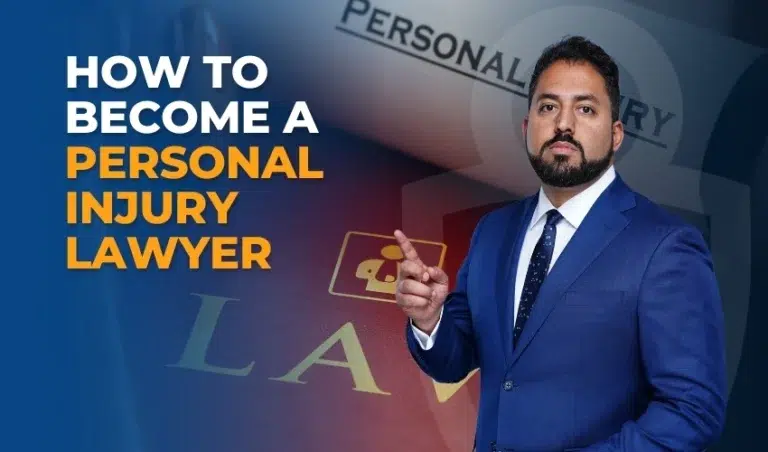If you’ve ever wondered what it takes to become a personal injury lawyer, you’re not alone. Personal injury lawyers are essential in advocating for people who have been harmed due to someone else’s negligence. Whether it involves car accidents, slip and falls, or other injuries, these legal professionals focus on helping injured individuals secure the compensation they need to recover and move forward. Let’s talk about the journey of becoming a personal injury lawyer, step by step, and what you can expect along the way.
What Is Personal Injury Law?
Before diving into how to become a personal injury lawyer, it’s essential to understand the nature of this legal field. Personal injury law is a branch of civil law that focuses on helping individuals who have suffered harm due to another party’s actions or negligence. This includes situations such as car accidents caused by reckless drivers, defective products that injure consumers, or unsafe work environments that lead to employee injuries. This includes injuries caused by car accidents, defective products, and workplace hazards.
As a personal injury lawyer, you would be responsible for representing plaintiffs—the injured individuals—to seek compensation for medical bills, lost wages, pain and suffering, and other damages. Success in this field often requires strong analytical skills, empathy, and the ability to communicate effectively with both clients and opposing parties. At its core, personal injury law is about standing up for individuals who need an advocate to navigate the legal system during some of the most challenging moments of their lives.
What Education Do You Need to Become a Personal Injury Lawyer?
The path begins with a solid educational foundation. To become a personal injury lawyer, here are the key educational steps:
- Earn a Bachelor’s Degree: There is no specific major required, but many aspiring lawyers choose fields like political science, pre-law, or business to build critical thinking and writing skills.
- Prepare for the LSAT: The LSAT assesses skills like logical reasoning and reading comprehension. Enrolling in prep courses or using online resources can help you achieve a competitive score.
- Attend Law School: During law school, focus on core subjects like torts, contracts, and civil procedure while selecting electives that align with personal injury law. In the United States, you’ll first need to earn a bachelor’s degree. There is no specific major required, but many aspiring lawyers choose fields like political science, pre-law, or business. These disciplines help you develop the critical thinking and writing skills necessary for success in law school. Regardless of your major, focusing on courses that emphasize research, analysis, and communication will serve you well.
Once you’ve completed your undergraduate degree, the next step is law school. To gain admission, you’ll need to take the Law School Admission Test (LSAT). The LSAT assesses skills like logical reasoning and reading comprehension, which are crucial for law school and your future legal career. Many aspiring lawyers prepare for this test by enrolling in LSAT prep courses, practicing with past exams, or using online study resources to build their skills. Preparing for this exam requires dedication, but a good score can open doors to reputable law schools.
What Do You Learn in Law School?
Law school is a three-year commitment that provides the knowledge and training necessary to practice law. During your first year, you’ll study foundational subjects like contracts, torts, civil procedure, and legal writing. Torts, in particular, will be highly relevant to personal injury law, as it deals with civil wrongs and the legal remedies available to injured parties.
In your second and third years, you can tailor your education by choosing electives that align with your interest in personal injury law. Courses like insurance law and trial advocacy can provide valuable insights and skills. Participating in internships or clinical programs is another essential part of law school. These opportunities allow you to gain practical experience by working on real cases under the supervision of practicing attorneys. For example, you might assist with drafting legal documents, conducting client interviews, or observing courtroom proceedings in a personal injury law firm, gaining firsthand exposure to the complexities of this field. Interning at a personal injury law firm can give you a clearer understanding of what this career entails.
How Do You Become Licensed to Practice Law?
After graduating from law school, the next step is obtaining your law license by passing the bar exam. Each state in the U.S. has its own bar examination, but most include the Multistate Bar Exam (MBE), which tests your knowledge of general legal principles. Additionally, you’ll need to pass a character and fitness evaluation, which examines your moral character and ethical standards.
Licensure is a significant milestone because it allows you to practice law in your chosen jurisdiction. It also involves a commitment to ongoing learning through continuing legal education (CLE), which helps you stay up to date with changes in the law.

How Do You Gain Experience as a Personal Injury Lawyer?
Experience is vital in building a successful career as a personal injury lawyer. You can gain practical exposure through the following avenues:
- Clerking for Judges or Working as Associates: In these roles, new attorneys research legal precedents, draft judicial opinions, or assist senior attorneys in case preparation.
- Internships at Personal Injury Law Firms: These provide hands-on experience with cases involving injured clients, such as gathering evidence, negotiating with insurance companies, or preparing for trial.
- Networking in the Legal Community: Joining bar associations and attending conferences helps build relationships with mentors and peers who can guide your career. Many new attorneys start their careers by clerking for a judge or working as associates at law firms. In these roles, you might research legal precedents, draft judicial opinions, or assist senior attorneys in case preparation. These experiences help you develop a strong foundation in legal analysis and procedural knowledge, which are critical in personal injury cases.
Working in a personal injury law firm can be particularly valuable. You’ll gain hands-on experience with cases involving injured clients, learning how to gather evidence, negotiate with insurance companies, and prepare for trial. Building relationships within the legal community, such as joining bar associations or attending legal conferences, can also help you establish a network of mentors and peers who can guide you as you grow in your career.
How Do You Develop Excellence in Personal Injury Law?
While gaining experience is essential, developing true expertise in personal injury law requires continuous learning. Many attorneys pursue certifications or advanced training in areas related to personal injury, such as wrongful death cases or catastrophic injuries. Some states offer specialized certifications for lawyers who meet specific criteria in a given field, which can help demonstrate your dedication to mastering this area of law.
Additionally, staying informed about legal trends, landmark cases, and legislative changes is important. Reading legal journals, attending seminars, and participating in CLE courses are effective ways to deepen your knowledge. The more you understand the nuances of personal injury law, the better equipped you’ll be to advocate for your clients.
What Career Paths Are Available in Personal Injury Law?
Once you’ve gained the necessary education, licensure, and experience, there are several career paths you can pursue within personal injury law. Many lawyers choose to work at law firms, where they handle cases involving car accidents, medical malpractice, or defective products. Others may open their own practices, offering a more entrepreneurial approach to serving clients. Some lawyers even work as in-house counsel for organizations that need legal proficiency in personal injury matters.
No matter the path you choose, building a successful career in personal injury law requires a commitment to ethical practices and client advocacy. This means putting your clients’ needs first and striving to achieve the best possible outcomes for them. It’s not always an easy job, but it can be deeply rewarding to know that your work makes a difference in people’s lives.
What Are the Challenges and Rewards of Being a Personal Injury Lawyer?
Like any profession, personal injury law comes with its challenges. The cases you handle may be emotionally taxing, as they often involve clients who are dealing with significant pain and loss. The work can also be demanding, requiring long hours and meticulous attention to detail.
However, the rewards of this career can far outweigh the challenges. Helping clients navigate the legal system and seek fair compensation to rebuild their lives is incredibly fulfilling. For instance, consider the case of a young mother injured in a car accident caused by a drunk driver. Through diligent work, her attorney helped her access the resources needed for medical treatment, rehabilitation, and supporting her family while she healed. Stories like these highlight the impact personal injury lawyers can have on their clients’ lives. Each case you take on is an opportunity to stand up for justice and make a meaningful impact. For many personal injury lawyers, the ability to advocate for those who might otherwise be overlooked is the most rewarding aspect of the job.

Is Personal Injury Law Right for You?
Becoming a personal injury lawyer is a journey that requires dedication, resilience, and a passion for helping others. It’s a field where you have the opportunity to combine legal prowess with compassion, standing up for individuals during some of the most challenging times in their lives. If you’re considering this path, take the time to reflect on what motivates you and whether you’re ready to commit to the rigorous education and training required.
Ultimately, personal injury law is about making a difference in people’s lives. Whether you’re just beginning your journey or looking to deepen your understanding of this field, this guide aims to provide valuable insights into what it takes to pursue this path.






